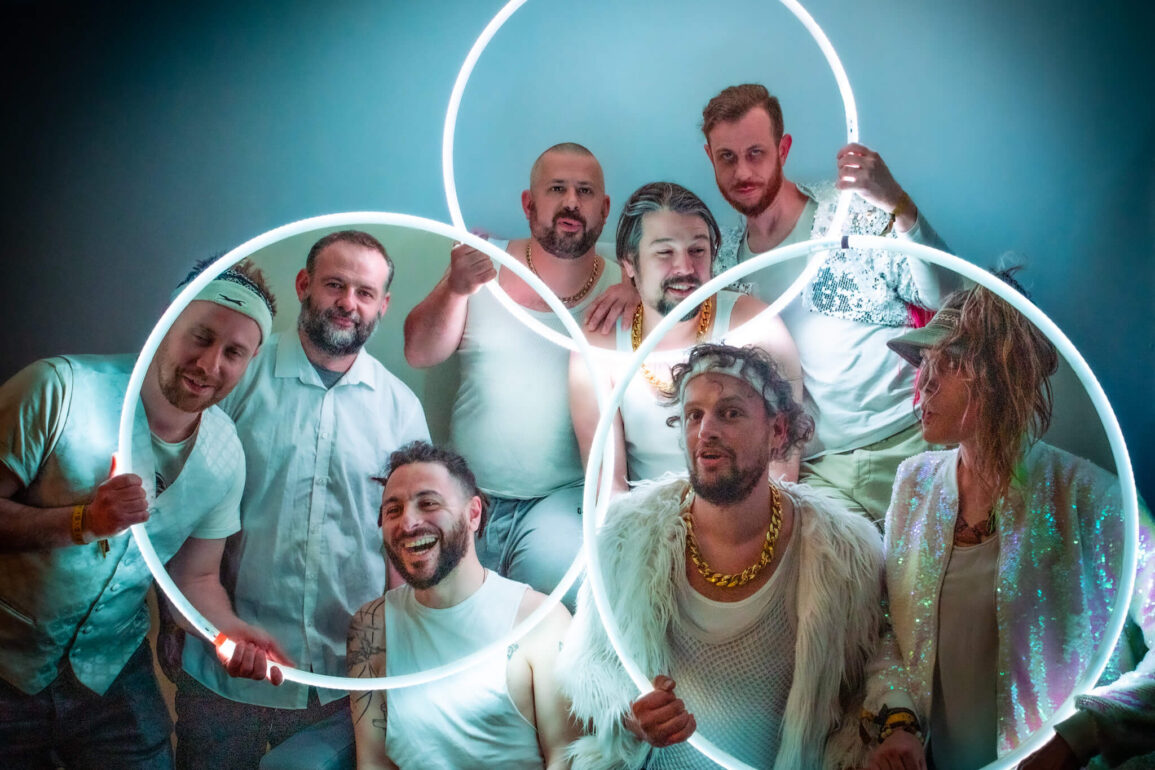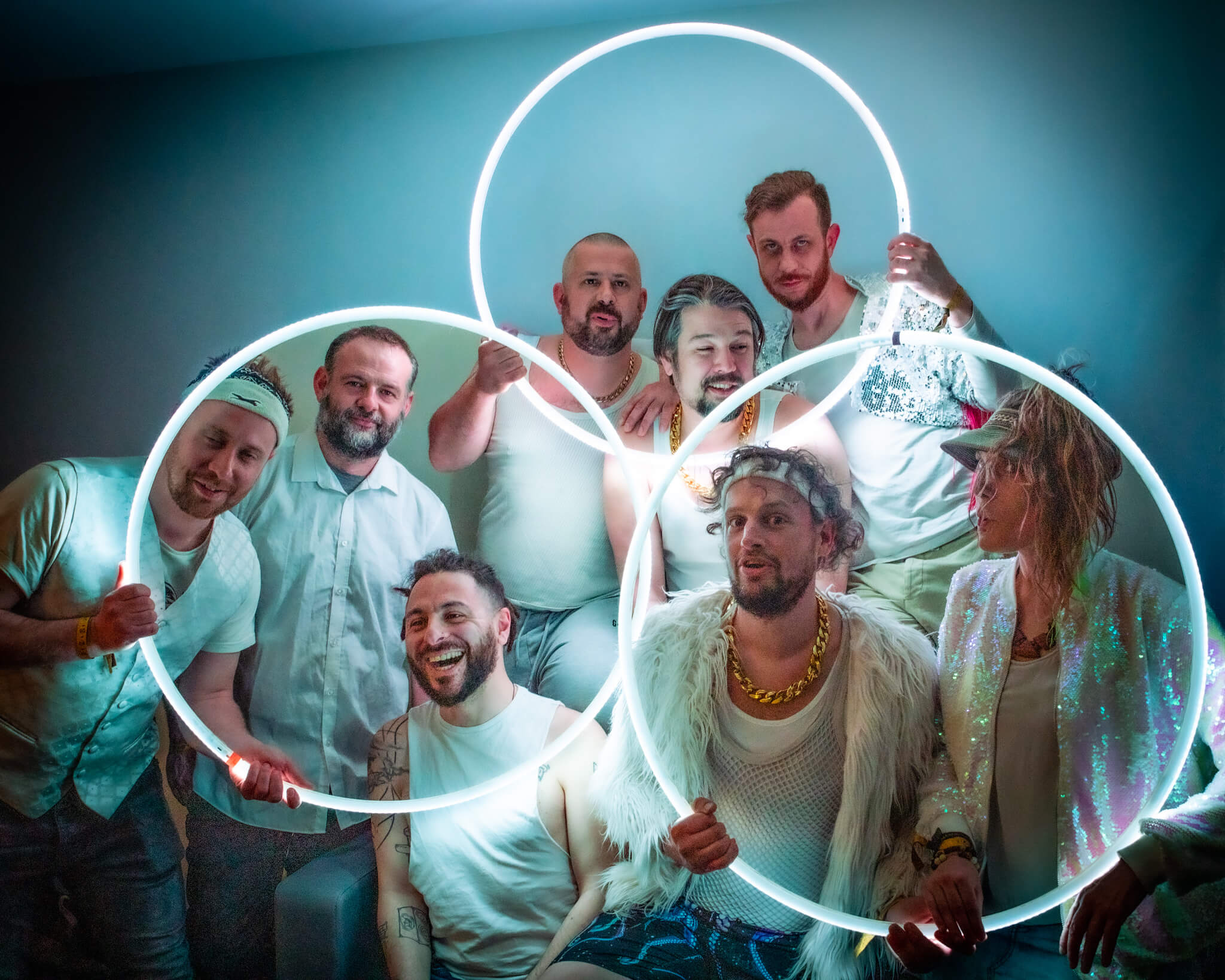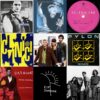Seas of Mirth are a band that embodies “juxtaposition” in the best kind of way. For starters, they are a nautical-inspired group who happen to reside in the landlocked East Midlands. And they’re about to set sail across the UK to embark on a tour to promote their new album Kriller. We spoke to Paul and Al from the band as they shared insights into their creative process, influences, musical experimentation and of course, what’s in their fridge.
How are you today and what have you been up to?
Al: I’m all good. I’m just chilling on my boat at the moment. I’ve had a busy day teaching children how to play a guitar and getting everything prepared for the album release on Friday, just making sure I’ve got everything in the right boxes and enough social media posts out there without putting too much in.
How would you describe your music in five words?
Al: Aquatic is definitely the first one. I’d say immersive without sounding pretentious, yeah. We’d like to draw the listener into a kind of sensory twist. Funky, aquatic, odyssey, immersive….
Paul: Can we say tickly?
Al: We like to reach those less-reached places of the brain. We work hard on intricate rhythms and try and exercise these bits of music that we don’t hear enough ourselves. So we always strive to set challenges for ourselves and make things sound nice and tickly.
Can you walk us through the journey that led to the creation of your new album, Kriller and this shift in musical direction?
Al: The sound that we had before the first album was very sort of in-your-face, erratic kind of almost anti sea-shanties, as it were, with a very folky lineup and very fierce and energetic, very sort of face-value lyrical jokes as well. I think by the second album, we kind of wanted to get away from this sort of on-the-nose lyrics and get a bit more into the nitty-gritty of the compositional vibes, working on different time signatures and a bit more influences from across the world and across time as well, while keeping it playful and quite silly. Then I think the third album was probably the biggest change we’ve had. What do you reckon, Paul?
Paul: Definitely. We were kind of pretty tied to a nautical thing, but not actually having a thing that ran through the whole album, that was like a story. I think we worked it sequentially, a bit which we hadn’t done before. It was done in order and then we couldn’t really take it apart from that order. It wouldn’t really work if you changed the order around, which is totally prog. And I suppose, Kriller, our latest album, is a mix of all those things in a way. I’d certainly say lockdown had a big part too.
Al: I think the whole deal with lockdown is the fact that you couldn’t party with other people and get on a dance floor and party in the ways that we were used to. And that spurred us on to get down into the grooves, really, and work on some solid grooves and get some serious dancefloor fodder out there. There’s tracks like, “Dig Out the Moves,” which is the single release that has got a thumping disco beat. And tracks like “Neon Paradise” as well, they’re very much significations of how it’s important to lose yourself on the dance floor. Everyone deserves those moments.
We like to provide these thematic feelings. I guess we went from the pirate thing to a general nautical thing. And now we’ve gone more subsurface. So everything lends itself to the more sort of sensory element, like the UV lights we have on stage, the big LED jellyfish and the octopus, and stuff like that. There was even a colour scheme that we’ve kind of stuck to. There’s still a loose theme going there, obviously with the name – the tenuous pun on the Michael Jackson album. But I think Kriller can be enjoyed in a thematic way and in a non-thematic way as well. You don’t always necessarily have to be in the mood for the sort of aesthetics that we kind of like to convey in music. It can just be in any good old mood. It’s got all the feels in there.
What can people expect at your live shows and how has your approach to playing live evolved over the years?
Al: I would say there’s always stuff to do. There’s the LED jellyfish and the sensory aesthetic visual side of the show. We’ve always strived to provide that because if we’re playing at a festival, even if you don’t like the music you’ll like how it looks. People like to get involved with stuff as well, we’ve got an age-old tradition of getting the audience to participate in a game of tug of war.
We’re keeping in line with the sensory direction and the tug of war is quite inescapable really, I don’t think we’ll ever be able to get rid of that. We love all the feedback we get and all the great photos of videos we get back from our shows as well. You can really see people having a very very good time out there.
You re-united with London producer Kristian ‘Capitol K’ Robinson for this album how did his collaboration influence the creative process and the overall sound of Kriller?
Al: He’s got a really magic touch, he’s a really sweet man and he worked an absolute dream on the previous album. He can fix stuff in seconds without saying a word and you generally don’t have to finish your sentence because he’s already sorted it. He’s an absolute pro. There’s lots of old-school analogue methods that he uses and lots of fancy effects. He doesn’t put any unnecessary pressure on you or anything he really makes you feel at home and that’s exactly what we wanted.
Paul: We recorded it half live as we wanted to really capture that energy so we recorded over a long weekend down in London while probably holding the Guinness world record for the most amount of olives eaten. We had one of those wholesale-size tubs of black olives and we nailed the whole thing which hopefully has given Kristian some enduring memories of our time together.
We found him because we had this realisation that about five years ago all the bands that we loved at that time like Super Best Friends Club, Comet is Coming etc, were linked to him. There was a really vibrant London scene at the time and we realised they were all by the same guy and we were like “well that’s the guy!” He’s definitely one of the best producers in the UK.
Can you tell us about some of the key influences and artists that have inspired your latest album?
Paul: Since the last album, I guess more groove-based artists I think earlier we had very mixed influences like Fleet Foxes around the time and that kind of English kind of folk which I guess was big at the time. And then this completely evolved, we’ve rediscovered older bands.
I think the last album was definitely influenced by Frank Zappa so this is moving away from that to stuff that’s got a groove in it. Talking Heads have always been a big influence for me.
Al: We’ve been compared to Cardiacs before so I started listening to them as a result so there’s some proper mad sections that reflect the music of Tim Smith. There’s also the more the sort of jazzy stuff like Bad Bad Not Good.
Paul: I think this this album has some retro 70s magic in there like from old Michael Jackson albums and bands like ELO and Steely Dan. After playing some new stuff live some people said we had a bit of a classic sound which I took as a nice compliment but maybe we’re showing our age a little bit.
Being based in the East Midlands, has the region influenced your musical and creative direction and do you feel a connection to the local music scene there?
Al: Yes, we’re constantly surrounded by brilliant talent everywhere. Derby is kind of a base in that both Paul and I met at Derby uni and we’ve that’s kind of been where we’ve lurked.
Paul: We collaborated with Yay Maria who is from Derby on this album. I’ve seen her perform about four or five times now and I think she’s probably going to be a megastar, she makes unbelievably well-produced pop, which is as good as anything you’d see in any of the major awards circuits and on any of the major labels. Alright the Captain, they’re good friends and I still listen to their music. Cheap Jazz, who were just so exciting at the time. We felt they were kind of miles away from what we were doing like they were serious band, a proper band.
Al: My Psychoanalyst as well and Haiku Salut. There was a bit of a golden era of music in Derby but at the same time, it’s never not golden. Vikasati are a dead cool jazzy three-piece from Derby who I really enjoyed seeing recently. I always feel like there’s a strong vein of talent across this sort of Derby/A52 stretch.
There’s also a bit of a new generation of psychey guitar bands in Notts cropping up at the moment like Grain, Bloodworm, Badhand and PASTE. I’m looking forward to seeing them again soon when I get a chance!
Who would your dream collaboration be?
Al: There’s a little-known band from America, I don’t know if they’re going anymore but they’re called Icy Demons and they’re fronted by a man called Griffin Rodriguez who’s whose compositions and harmonies are just absolute nectar for me to listen. I like the way their music is created and composed with complete disregard for any trends or any sort of prefixes laid out by the current musical environment.
Paul: I quite like the idea of working with a composer that would be cool. We’ve been talking about doing a musical for about 15 years now, jokingly but then… it would be kind of fun. I like the idea of working with someone who’s doing sweeping strings and that filmic score type thing and having an opportunity to work with a huge ensemble of musicians. I think Arthur Veracoi would be amazing to work with.
Can you give us a glimpse into your future plans as a band and are there any artistic directions you are excited to explore?
Al: There’s the upcoming tour to support the album that starts next month, it’s a wide-spread of the UK, we’ve got 15 dates and we’re very much looking forward to it and playing the tunes from Kriller. I guess the plan is just to let this album reach as many ears as possible, and let people into our weird and wonderful but welcoming world.
If I looked in your fridge right now what would I find?
Al: Very questionable butter.
Paul: The milk’s definitely gone, I can tell you that for sure I found that out this morning.
Find out where you can catch Seas of Mirth on their UK tour this autumn.





